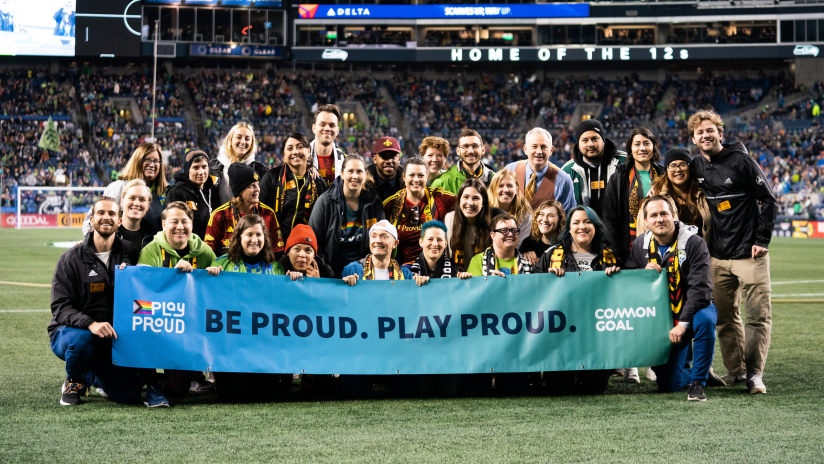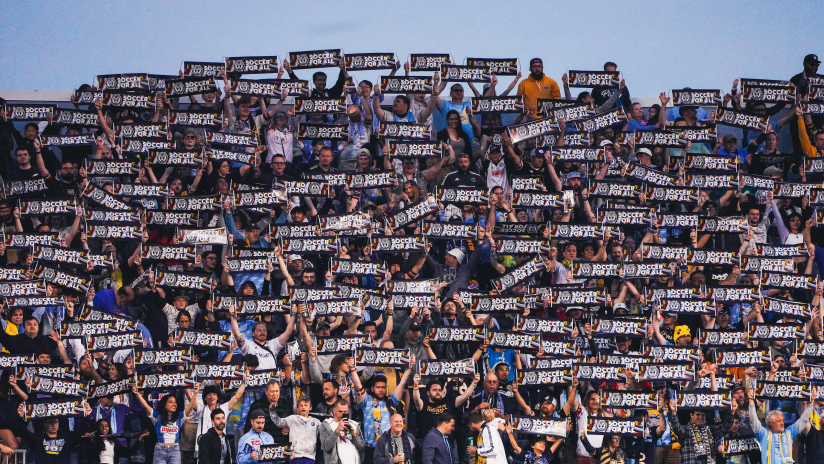The framework was there. When Juan Mata pledged to give 1% of his salary to charities in 2017, he, along with Common Goal co-founder and CEO Jürgen Griesbeck, sparked an initiative to steer 1% of the estimated $58 billion global soccer industry towards community-based organizations and DEI programs.
The fundamental philosophy: Soccer, as the world’s most popular sport, is one of the few cultural forces strong enough to shift society towards a more sustainable and equitable future for all, and, by mobilizing 1% of revenue from across the industry and partnering with high-impact community organizations from around the world, Common Goal could make that future a reality.
The player pledges and community partners grew exponentially (Common Goal now works with 160 organizations in 106 countries worldwide), but for Play Proud founder Lilli Barrett-O'Keefe, there was a gap in those early days around funding and awareness for LGBTQ+ inclusion.
In 2018, when running NYCFC’s Saturday Night Lights program, she witnessed the knock-on effects those gaps had on young LGBTQ+ players.
“We didn't have any specific coaches or coach training that was intentionally creating safe spaces for LGBTQ youth. And unfortunately, we had multiple suicide attempts, young people that were hospitalized,” said Barrett-O'Keefe.
“... I was sort of seeing this firsthand as a social worker, as someone like a youth advocate that was on the ground. And then in addition, I was like, how can we get more resources into investing?”
And so the Play Proud initiative, under the umbrella of Common Goal, came to be. And this time it was US women’s national team star and renowned global activist Megan Rapinoe who got the ball rolling from the player’s side, donating 1% of her salary specifically to the then-fledgling grass-roots driven program.
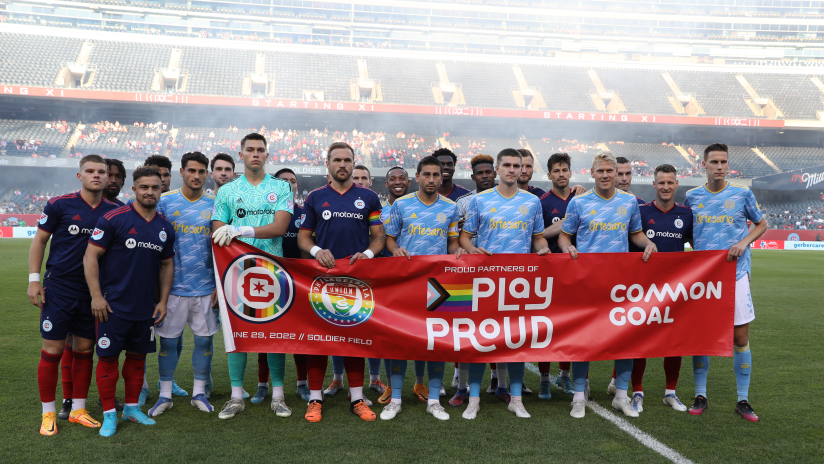
“We launched the initiative during the 2018 men's World Cup in Russia, which obviously, for many reasons, was an important moment to make a stance around LGBTQ inclusion,” said Barrett-O'Keefe. “And then from there, we've implemented programs since 2018.
“We've reached over 400,000 young people in 14 countries worldwide. And, specifically in the US, our model is around really holistically working with clubs, working with fans and working with community-based organizations.”
Working with MLS clubs and beyond
That drive to connect holistically is at the heart of Play Proud’s current mission to build more diverse, inclusive and accessible communities in North America leading up to the 2026 Men’s World Cup in the US, Canada and Mexico.
Their method follows a type of “train the trainer” model, where Play Proud leads clubs from across six different North American soccer leagues in 100-hour, in-person diversity, equity and inclusion (DEI) trainings. The club representatives then take that knowledge back to their communities and put it into action, enacting tangible change while also becoming leaders and trainers themselves.
In 2022, Philadelphia Union and Chicago Fire FC completed the residency, and this year, Seattle Sounders FC and Toronto FC are in line to complete it too, having both already finished the first 50-hour workshop, which the Sounders hosted. In keeping with the initiative’s grassroots model, each club’s front office representatives are also joined at the workshops by members of their supporters’ groups and affiliated community organizations.
“What's very unique about the design of this program is that it's incredibly immersive,” said Barrett-O’Keefe. “And so it's not a two-hour workshop on Zoom. This is two, 50-hour training sessions and we take the same people for the whole year.”
For the attendees, that chance to learn in a face-to-face, collaborative environment has made all the difference in digging past surface-level conversations in order to find deeper roots of understanding from which they can build.
“I think for me, it was really having those difficult conversations. They were very, very difficult," said Chicago Fire FC’s executive director of community soccer Lee Hannant. “... But that enabled me to truly understand issues, so then we could start to tackle those issues. And I think that's the most important part.”
Evan Whitfield, Chicago’s vice president of equity, alumni relations and engagement, who attended both workshops with Hannant, built on that point:
“I think the barrier to allyship for those of us who feel they're on the outside so often is fear and ignorance, and being unsure in the moment. It freezes you. … What I took from Play Proud and any kind of DEI work I do is that when you feel knowledgeable and you have an understanding, it empowers you to take action.”
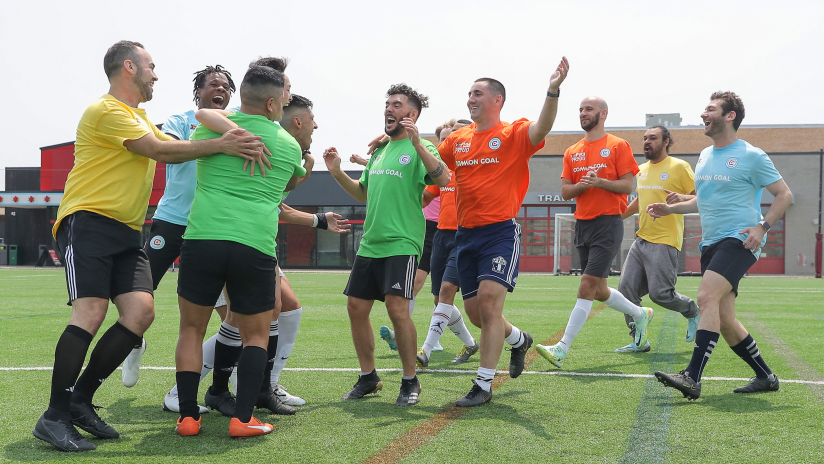
Real change
And take action they have. Each club representative who spoke with MLSsoccer.com about their experience in the residency cited changes both big and small they’ve made to create more structurally inclusive environments within their front offices, stadiums and communities.
One of Chicago’s key actions was to create the Play Proud League, an adult recreational soccer league designed to be a physically and psychologically safe space for LGBTQ+ people, friends and allies to compete and build community. They also worked with Allie Gentile, director of community relations for the Union and a fellow 2022 Play Proud attendee, to organize a joint demonstration from both teams showing solidarity with the LGBTQ+ community ahead of the Fire’s 2022 Pride Match.
Gentile enacted change back home with the Union too, organizing trainings on gender identity and sexual orientation for the club’s staff, specifically focusing on gameday inclusion and safety.
“All of our staff actually wear safe space pins during our matches on our lanyards, just letting anyone know that we are someone that they can come talk to if they need to report something, if they have a question, that they can do so free of discrimination and that we're always there to listen,” said Gentile.
Justin Morrow, Toronto FC’s technical development manager, meets every week with Toronto’s supporters’ group and community partner representatives, and, together, the group already organized a youth summit ahead of their May 17 Pride match, where TFC supporters worked with youth attendees to create, color and paint banners that were hung at the stadium for their Pride match.
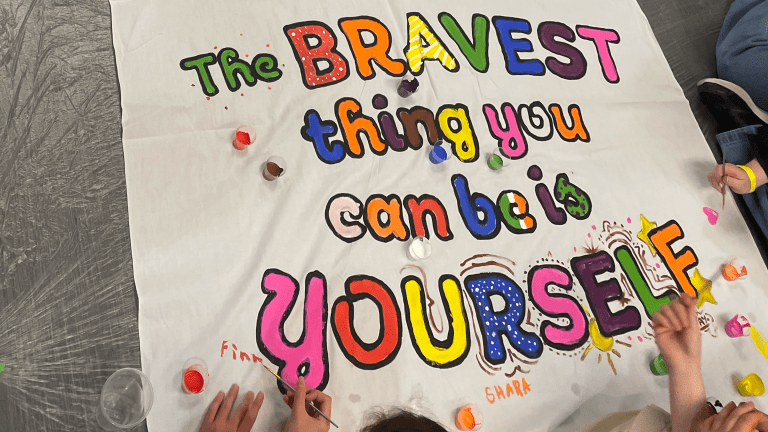
Meanwhile, Seattle Sounders FC, already renowned for their social work as MLS’ Inclusion and Impact Award recipient in 2022, relished the opportunity to host the first 50-hour Play Proud workshop in 2023 and surround themselves with other experts and leaders in the field.
“We got to be under a microscope a little bit as a host. Those are all really invaluable experiences. So we were able to not only build capacity in some leaders… but we also got to do it by sort of auditing ourselves, which is really wonderful,” said Sounders chief operating officer Maya Mendoza-Exstrom.
Some of Seattle’s many community-focused activations for 2023 include hosting LGBTQ+-owned food trucks for their Pride match on June 24 and auctioning off Pride apparel to benefit organizations that advocate for LGBTQ+ students.
Making soccer a safe place for all
There’s still a ways to go. According to stats shared by Play Proud, 73% of LGBTQ+ youth in the US believe sporting spaces are not safe or welcoming, and LGBTQ+ youth drop out of sports at two times the rate of their heterosexual peers.
Morrow, who before joining TFC’s front office in 2022 logged over 20,000 MLS minutes as one of the league’s best left backs, has seen firsthand the need for creating a more welcoming soccer environment for LGBTQ+ athletes, particularly on the men’s side of the game.
“I do believe that there's a lot of work to be done there. Hopefully programs like this can help in that way, but there's a lot of education, there's a lot of training [needed], because the sport and male sports in general are insular, and they espouse traditional models of masculinity,” said the 2021 MLS Works Humanitarian of the Year.
Barrett-O’Keefe emphasized a similar need to create safer spaces within the game, while also pointing to encouraging stories from players like Collin Martin, who, in 2018, became the second-ever active MLS player to come out as gay.
“[Martin] had a very positive experience in the locker room with the coaching staff, with the fans, when he came out as the second male MLS player after Robbie,” said Barrett-O’Keefe of the current San Diego Loyal midfielder who also donates 1% of his salary to Play Proud.
“And so there are more Collin Martins out there and there are Collin Martins on the coaching staff in the front office, in community-based groups in the stadium and on social media. And so how can we show up as an MLS community to show that there is space for gay male athletes and gay male fans in the men's game? And I also think more so than ever, we need to be allies. And we need to be allies to every letter in the LGBTQ acronym.”
As part of MLS’s support of the LGBTQ+ community, and in celebration of Pride month, the league is making donations to both Play Proud and Athlete Ally. You can learn more about each club’s Pride Month activations here.
